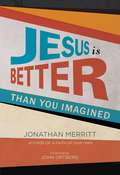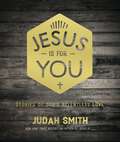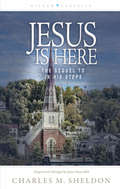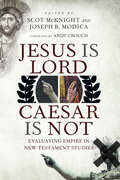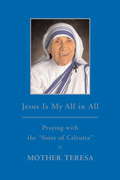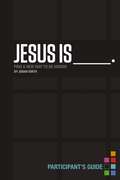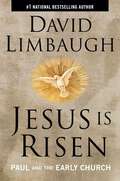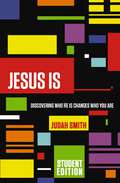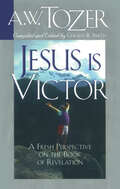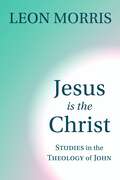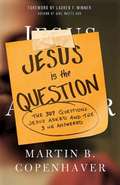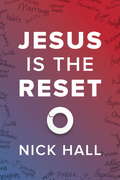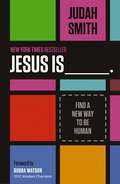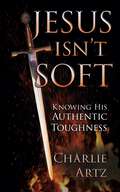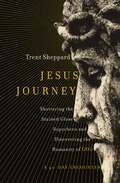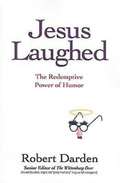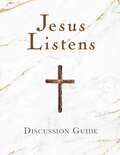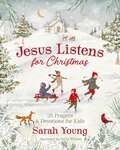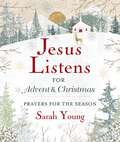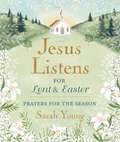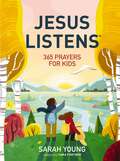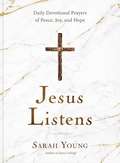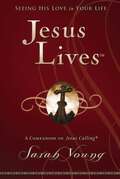- Table View
- List View
Jesus Is Better than You Imagined
by John Ortberg Jonathan MerrittIs the God who created us better than the God we've created?After following Jesus for nearly two decades, Jonathan Merritt decides to confront the emptiness of a faith that has become dry, predictable, and rote. In a moment of desperation, he cries out for God to show up and surprise him, and over the next year, God doesn't disappoint.In JESUS IS BETTER THAN YOU IMAGINED, Jonathan shares vulnerable, never-before-shared stories of how he learned to encounter Jesus in unexpected ways. Through a 60-hour vow of silence in a desert monastery, he experiences Jesus in silence. When a friend dies of a rare disease, he sees Jesus in tragedy. Through confronting childhood sexual abuse, Jonathan discovers Jesus in honesty. In an anti-Christian-themed bar, he finds Jesus in sacrilege. And when he's almost kidnapped in Haiti by armed bandits, he experiences Jesus in the impossible.Though Merritt finds himself in places he never dreamed of, he doesn't lose his way. Instead, these experiences force him back to the Bible, where he repeatedly offers fresh, sometimes provocative, interpretations of familiar passages. Along the way, he throws back the covers on the sleepy faith of many Christians, urging them to search for the Holy in their midst.Pointed and poignant by turns, Jonathan helps readers open their hearts to a mysterious God and a faith that sustains, guides, and most importantly, surprises. His fearlessly honest story invites us all to discover the messy mercy and crazy grace of a sometimes startling Savior.
Jesus Is For You: Stories of God's Relentless Love
by Judah SmithWhat would it be like if someone were completely, 100 percent for you? The loser. The rising star. The drug addict. The good Christian kid gone bad. The undeserving overwhelmed with gratitude. Whoever you are and wherever you've been--Jesus is for you. Not when you clean up your act or when do the right thing or when put your life back together. Jesus is for you--in the midst of now. Whether you woke up amazed by your blessings or shamed by the worst mistake of your life. Jesus is for you and with you, and He's not going anywhere. The heartfelt and honest stories in these pages reveal what it means to experience Jesus and discover the real life He promises. With insight from New York Times-bestselling author Judah Smith and backed by Scripture, this book will allow you breathe deeply the profound truth that Jesus is for you.
Jesus Is Here: The Sequel to In His Steps (Inspirational Library)
by Charles SheldonJesus Is Here begins seventeen years after the close of the bestselling classic In His Steps, continuing the story of the main characters of Sheldon's first novel. Join Reverend Henry Maxwell and his congregation as they experience the living presence of the man Jesus, who revolutionizes the modern world and challenges their daily lives to the very core.Sheldon said, "It has not been my purpose to describe what is called the second coming of Christ, but to picture another appearance of Jesus and describe His action in a modern world. The world today is far different from the world in which the historical Jesus was born."Jesus Is Here is a challenging reminder that our world needs to know Jesus as a real person who truly is here with us throughout the activities and events of our daily lives.
Jesus Is Lord, Caesar Is Not: Evaluating Empire in New Testament Studies
by Scot McKnightempiremustaboutJesus Is Lord, Caesar Is NotDavid NystromJudith A. DiehlJoel WillitsDean PinterChristopher W. SkinnerDrew StraitMichael F. BirdLynn CohickAllan R. BevereDwight Sheets
Jesus Is Lord: An Introduction to the New Testament (Second Edition)
by Kenneth SchenckThis book has arisen from a number of concerns. Perhaps the greatest is the incredible gap that often exists between the academy and the pew. The developments and agreements that are common knowledge among scholars often take decades to filter down to the layperson. Sometimes by then the scholars have even changed their minds! Even worse is setting up our youth for faith crises because we stake Christianity on something inappropriate, like a particular version of the Bible or on the possibility of harmonizing the gospels. How often we forget that the living, exalted Christ stands at the heart of the matter. It is to Him that the Bible points! This book shows that we too often have let the skeptic set the terms of debate over the Bible. When we let the Bible's world set its own terms, many of these "problems" disappear.
Jesus Is My All in All: Praying with the Saint of Calcutta
by Mother TeresaThe postulator for Mother Teresa's cause for sainthood, Father Brian Kolodiejchuk, has culled some of her most stirring words into a powerful book that her admirers will treasure. JESUS IS MY ALL IN ALL follows the Roman Catholic novena format; derived from the Latin word for nine, the novena provides a nine-day rhythm of prayer and reflection. A prayer to Mother Teresa herself is the foundation for each day's reflections, which illuminate such topics as:* Finding Jesus in your heart* Becoming convinced of Jesus' love for you* Seeking guidance from Mary the Mother of Jesus* Drawing on Jesus' thirst to quench the needs of those around youAccompanied by striking full-color images, JESUS IS MY ALL IN ALL immortalizes the words and wisdom of one of humanity's most radiant women.From the Hardcover edition.
Jesus Is Participant's Guide: Find a New Way to Be Human
by Judah SmithJudah Smith digs deep to answer the most common and the most difficult questions about Jesus, a man so few understand and so many desperately need. In Jesus Is, Judah Smith explores a number of topics that reveal Jesus' purpose for coming, what He accomplished while He was here, and what that means for us. Jesus is greatly revered, harshly criticized, and sorely misunderstood. Judah breaks down who Jesus is and explains to readers how understanding Jesus more fully will not only enrich their lives, but also give them meaning, as well as save them.The 8-week Jesus Is Participant's Guide, intended for use with the DVD-based study of the same title, will help participants discover how to have a deeper, lasting relationship with Jesus, and to commune with and grow in Him. Judah will show you that Jesus is more than a good teacher, more than an inspiring leader. He is the point of all life.Perfect for evangelism, the video sessions will help new Christians understand the person of Jesus, as well as help small group participants connect with one another.
Jesus Is Risen: Paul and the Early Church
by David LimbaughOriginally confined to a small circle of believers centered in Jerusalem, Christianity's stunning transformation into the world's most popular faith is one of history's greatest, most miraculous stories. <P><P>In Jesus Is Risen, #1 bestselling author David Limbaugh provides a riveting account of the birth of Christianity. Using the Book of Acts and six New Testament epistles as his guide, Limbaugh takes readers on an exhilarating journey through the sorrow and suffering, as well as the joys and triumphs, of the apostles and other key figures as Christianity bursts through the borders of Judea following the death, resurrection, and ascension of Jesus Christ. <P><P> Limbaugh particularly focuses on the crucial role that the Apostle Paul played in these historic events. Facing incredible adversities, from arrests to shipwrecks to violent mobs and murder plots, Paul overcomes countless obstacles as he travels far and wise to spread the Gospel. <P><P>Limbaugh's passion for the Bible is unmistakable and infectious as he recounts these stories. Replete with deep insights into the actions, arguments, and challenges of the world's first Christian communities, Jesus Is Risen is a faith-affirming book for Christians at all stages of their faith walk. <P><b>A New York Times Bestseller</b>
Jesus Is Student Edition: Discovering Who He Is Changes Who You Are
by Judah SmithThe New York Times bestseller shows students that discovering who Jesus is will change who they are!In Jesus Is _______. Student Edition, popular speaker, author, and former youth pastor Judah Smith reveals the character of Jesus and the importance of Christ's message. Adapted for a student's age and life experience, this compelling book will get younger readers thinking about what Jesus means to them.Judah Smith, pastor of the City Church in Seattle, Washington, is a former youth minister. He understands kids and writes to as if to a friend. With enthusiasm and humor, Smith shows that Jesus is life, Jesus is grace, and Jesus is your friend. The student edition includes new content for younger readers ages 10-14--humorous lists, callouts of key text, sidebars with additional information, and discussion questions. This is a book for kids who have grown up in the church, are new to faith in Jesus, or are seeking to know more. This book will allow students to grow with Jesus from a young age and to know that the point of life is having a real, honest relationship with Jesus.Trim Size: 5.5 x 8.375
Jesus Is Victor: A Fresh Perspective on the Book of Revelation
by A. W. TozerJesus is Victor is a compilation of the only 14 tapes that can be found of A. W. Tozer's 1961 Revelation sermons. Though not a complete study of the entire book, it offers a timely and vivid spiritual lesson to each and every one of us,Instead of trying to interpret the various events of Revelation, Tozer looks at the underlying spiritual lessons of the book, such as:The basic truth that Jesus is Victor The strong message of repentanceThe holiness of JesusThe wrath of GodThis book is not a presentation of any certain eschatological view, but a plea for readers to repent. It is A. W. Tozer's desire that all who would pursue the truth of Revelation to be overcomers and rest their faith on the goodness and grace of a loving and just Creator God.
Jesus Is Victor: A Fresh Perspective on the Book of Revelation
by A. W. TozerJesus is Victor is a compilation of the only 14 tapes that can be found of A. W. Tozer's 1961 Revelation sermons. Though not a complete study of the entire book, it offers a timely and vivid spiritual lesson to each and every one of us,Instead of trying to interpret the various events of Revelation, Tozer looks at the underlying spiritual lessons of the book, such as:The basic truth that Jesus is Victor The strong message of repentanceThe holiness of JesusThe wrath of GodThis book is not a presentation of any certain eschatological view, but a plea for readers to repent. It is A. W. Tozer's desire that all who would pursue the truth of Revelation to be overcomers and rest their faith on the goodness and grace of a loving and just Creator God.
Jesus Is the Christ: Studies in the Theology of John
by Leon MorrisMore than simply a series of chapters on the theology of John's Gospel, Jesus Is the Christ relates each of John's teachings to his declared aim, expressed in John 20: 30-31: "Jesus did many other signs before his disciples, which have not been written in this book; but these have been written that you may believe that Jesus is the Christ, the Son of God, and that believing you may have life in his name." Indeed, each chapter in Morris's book takes up some facet or aspect of John's expressed aim.For an age still asking the question "Who is Jesus?" Leon Morris argues convincingly that John's entire Gospel was written to show that the human Jesus is the Christ, or Messiah, as well as the Son of God. But it is Morris's firm conviction that John's purpose was evangelical as well as theological -- that is, John wrote his book so that readers might believe in Christ and as a result have eternal life.
Jesus Is the Question: The 307 Questions Jesus Asked and the 3 He Answered
by Martin B. CopenhaverContrary to some common assumptions, Jesus is not the ultimate Answer Man, but more like the Great Questioner. In the Gospels Jesus asks many more questions than he answers. To be precise, Jesus asks 307 questions. He is asked 183 of which he only answers 3. Asking questions was central to Jesus’ life and teachings. In fact, for every question he answers directly he asks—literally—a hundred. Jesus is the Question considers the questions Jesus asks—what they tell us about Jesus and, more important, what our responses might say about what it means to follow Him. Through Jesus’ questions, he modeled the struggle, the wondering, the thinking it through that helps us draw closer to God and better understand, not just the answer, but ourselves, our process and ultimately why questions are among Jesus’ most profound gifts for a life of faith. A game-changer of a book.
Jesus Is the Reset
by Nick Hall"Our prayer for you, as you make your way through this book, is that your life would be the next one changed. ...Jesus really does change everything. Whatever you need 'reset' in your life can be changed here and now, today." --From the book's foreword by Josh McDowell, Luis Palau, and Ravi Zacharias #JesusChangesEverything #JesusIsTheReset Let Jesus Be Your Reset Do you want to make a difference with your life, but you're having trouble moving on from your past? "Follow me," Jesus told his early followers, "and I'll show you life as it was meant to be lived." Nick Hall reminds us that Jesus says the same thing to us today: "Trust me. Follow me. Come to me dirty, and I'll clean you up. Come broken, and I'll reassemble the parts. Come desperate, and I'll replace pain with joy. Come to me with all your questions, all your confusion, all your fear. I can reset your purity, your self-image, your faith. Come." Whatever has been holding you back, a reset is available to you by the grace of God. Say yes to the life you were meant to live. From the Hardcover edition.
Jesus Is: Find a New Way to Be Human
by Judah Smith Bubba WatsonA New York Times Best-Seller!Jesus is ____. How would you finish thatsentence? The subjectis there, and so is the verb, but what comes next? Your answer could shed lighton the path to becoming who you were made to be. In thesepages, Judah Smith fills out that sentence again and again, each time furtherrevealing the character of Jesus. He writes as if to a friend, illustrating theimportance of Christ's message to modern men and women. This is a book for newbelievers, for lifelong followers, and for the merely curious.Judah Smith shows us the Jesus that somber paintingsand hymns fail to capture. With passion, humor, and conviction, he shows thatJesus is life. Jesus is grace. Jesus is your friend. Jesus is a new and betterway to be human.
Jesus Isn't Soft: Knowing His Authentic Toughness
by Charlie Artz"I am the way, the truth, and the life. No one comes to the Father except through Me. ~ Jesus, John 14:6 KJVPeople propagate a "soft Jesus" to justify their own weakness, unbelief, lack of faith or to advance a political agenda in contradiction of God’s unequivocal Word. They try to jam Jesus into a mold consistent with what they want Jesus to be according to their needs, ignoring who Jesus truly is. No reasonable basis in fact or law justifies this approach.Called to recruit, equip, train, and mobilize spiritual warriors for spiritual battle, teacher and attorney, Charlie Artz, challenges the notion of a "soft Jesus" by revealing Jesus' authentic toughness.If you see Jesus as genteel and soft, if your belief is more about convenience than fact, or if you're imprisoned—literally or figuratively—this book is for you.It's time to change your perception.A false balance is abomination to the LORD: but a just weight is His delight. ~Proverbs 11:1 This book sets the scales back in balance, weighing the meekness of the Lord Jesus and the Christ follower accurately with the limitless strength of the Lord Jesus Christ and what is available to us who follow Him. Expect this book to body check any and every dilution, modification, or misrepresentation of the divine nature of God, and get set on fire with the biblical truth of Jesus. ~Ibukun Olagbemi, D.M.D., Olagbemi Endodontics, LLCYour knowledge and flow of the Word is incredible and you are in the middle of validating a very good calling for you as a spiritual warrior. ~Steve Economopoulos, CFP, ChFC, CMT, Chief Executive Officer, Chief Investment Strategist, Econ Wealth ManagementAmazing writing, great message. ~Edgar Lopez, Legacy Faith Church, Harrisburg, PAThe book does well to challenge people’s perception of Christ which allows them to receive the image of Him greater than they have previously allowed themselves, or accepted. ~Steve Prouse, Fourth Watch MinistriesAbout the AuthorCharlie Artz has practiced healthcare law for 34 years in Harrisburg, Pennsylvania. He has briefed and/or argued more than two dozen cases in Pennsylvania appellate courts and the United States Court of Appeals and won a case in the Pennsylvania Supreme Court. His writing style is characterized by compelling advocacy, linear logic, simplification of complex issues, and humor. Teaching is his primary spiritual gift. Coupled with his legal skills, his gifting provides a unique platform to proclaim the Gospel of Jesus Christ. Charlie unabashedly shares his Faith and encourages others to do so. He has been called to recruit, equip, train, and mobilize spiritual warriors for spiritual battle in the marketplace, the gym, the home, and the ballpark to facilitate a personal move of God in people’s lives for the purposes of transformation and revival. He operates in Faith without fear. He is blessed to be the dad of four beautiful, brilliant, and redeemed children.
Jesus Journey: Shattering the Stained Glass Superhero and Discovering the Humanity of God
by Trent SheppardJesus was human, like you and me. If the gospel is true, he still is.Christians worldwide believe that Jesus is God. But this belief wasn’t the starting point for Jesus’ earliest followers. While Jesus’ humanity was a given for the disciples, his divinity was a truth they grew into believing—it was a journey of faith. As Christians today, we are also called into a faith journey—this time, to rediscover Jesus’ humanity.Yes, we believe that Jesus is God, but do we truly believe that Jesus is human? And if so, how does that transform our own experience of being human?Through eye-opening yet down-to-earth reflections, Jesus Journey invites you to encounter Jesus again—as if for the first time—by experiencing his breathing, heart-beating, body-and-blood, crying-and-laughing humanity.Join Bible teacher and storyteller Trent Sheppard as he shines new light on the vibrant humanity of the historical Jesus through an up-close look at Jesus’ relationships with Mary and Joseph, with the God he called Abba, with his closest friends and followers, and how, ultimately, his crucifixion and resurrection finally and forever redefine what we mean by the word God. Come encounter the human who radically transforms our view of God.Come encounter the God who forever changes what it means to be human.
Jesus Laughed: The Redemptive Power of Humor
by Robert Darden“Agony and hilarity,” said Norman MacLean, “are both necessary for salvation.” We Christians seem to know a lot about the agony part, but what about hilarity? Why do we have to remind ourselves so often that the Bible is full of funny and ridiculous stories and situations? Why do so few of the pictures we’ve drawn of Jesus show him laughing? Because we’ve forgotten the redemptive power of humor, that’s why. In Jesus Laughed, Robert Darden–senior editor of The Wittenburg Door, the world’s oldest, largest, and pretty much only religious satire magazine–draws on his years of experience deflating religious pomposity and making the faithful laugh to show why humor is so central to the faith, and how to make it a big part of your daily walk with God.Click here to listen to Terri Gross's interview with Robert Darden on NPR's Fresh Air about the Black Gospel Music Restoration Project. Darden runs the project at Baylor University where he is a journalism professor. The purpose of the project is to identify, acquire, preserve, record, and catalogue the most at-risk music from the black gospel music tradition, primarily between 1945 and 1970. Robert Darden is Associate Professor of Journalism at Baylor University in Waco, Texas. He served for 12 years as Gospel Music Editor for Billboard magazine, and since 1988 has been Senior Editor of The Wittenburg Door, the world’s oldest, largest, and “pretty much only” religious satire magazine. He is the author of more than 25 books, including the definitive People Get Ready! A New History of Black Gospel Music, which has been featured on National Public Radio, and Reluctant Prophets and Clueless Disciples, also published by Abingdon Press.
Jesus Listens Discussion Guide
by Sarah YoungJesus Listens® Discussion Guide is a companion to Jesus Listens by Sarah Young. Jesus Listens, the newest 365-day devotional prayer book from Sarah Young, bestselling author of Jesus Calling, takes you on a year-long journey to develop a meaningful prayer life. Devotional prayers based on scripture will lead you into a deeper, richer relationship with God.
Jesus Listens for Christmas: 25 Prayers and Devotions for Kids
by Sarah YoungReflect on the meaning of Jesus&’ birth this Advent with Sarah Young&’s Jesus Listens for Christmas: 25 Prayers and Devotions for Kids. Your family will journey into the heart of the nativity story with Scripture verses, prayers, reflections, and simple activities as you anticipate and celebrate the Savior&’s coming.This keepsake devotional is ideal forreminding preschool and elementary aged kids to focus on the anticipation of Christ&’s birth;providing a moment of comfort, calm, and peace during a busy season; andcultivating a tradition of Advent prayers and devotions as a family.This full-color, large-format book includesprayers and reflections based on the Christmas story and prophecies of Jesus&’ coming;Bible verses and suggestions for further Advent Scripture reading;quick and simple activities that will help kids understand and remember what Jesus&’ birth means for them;heartwarming, wintry illustrations; anda gorgeous, deluxe cover and presentation page.Bring your family together to spend time with Jesus as you move closer to the blessed day when the Savior was born.
Jesus Listens--for Advent and Christmas, with Full Scriptures: Prayers for the Season (A 40-Day Devotional)
by Sarah YoungThis devotional collection of prayers and reflections from Sarah Young's bestselling Jesus Listens® and Jesus Calling prepares your spirit for the Savior's coming, helps you spend the days of Advent and Christmas with intentionality, and carries you into the New Year with your heart and mind fixed on Jesus.Enjoy more peaceful moments this holiday season with Jesus Listens—for Advent and Christmas. This inspirational holiday devotional also includes Scripture verses, and words of hope from God's heart to yours.Jesus Listens—for Advent and Christmas is ideal for:Anyone longing to draw closer to Jesus during the Advent and Christmas season.Those who are looking for comfort, calm, and peace in place of the holiday bustle.Families who want to cultivate a tradition of Advent prayers and devotions together. This full-color prayer book includes:Prayers, reflections, and Bible verses based on the Christmas story and prophecies of Jesus' birth.Stunning seasonal illustrations, making this holiday treasure a beautiful gift or keepsake. As you pray Scripture throughout this holiday season, you'll experience not only God's answers, but also how prayer connects you to God, changes your heart, and brings peace and joy to one of the greatest celebrations of the year.Enjoy Sarah Young's other Christmas books:Jesus Calling for ChristmasJesus Calling: The Story of Christmas (picture book)Jesus Calling: The Story of Christmas (board book)Jesus Calling Advent and Christmas Prayers
Jesus Listens--for Lent and Easter, with Full Scriptures: Prayers for the Season
by Sarah YoungThis devotional collection of prayers and reflections from Sarah Young's bestselling Jesus Listens® and Jesus Calling helps you walk through the season of Lent with an intentional focus on your Savior and prepares you for the joy and victory of His resurrection at Easter.Walk closely with the Lord as you read through Jesus Listens—for Lent and Easter. This inspirational devotional prayer book also includes Bible verses and words of hope from God's heart to yours.Jesus Listens—for Lent and Easter is ideal for:Anyone longing to draw closer to Jesus during the Lenten and Easter seasonsThose who are looking for peace, forgiveness, and a deeper experience of trusting GodFamilies who want to cultivate a tradition of Lenten prayers and devotions together This full-color, beautifully illustrated book includes:Prayers, reflections, and Bible verses based on Jesus' life and sacrifice for usStunning spring and Easter season illustrations, making this a holiday treasure to cherish for years to comeAs you pray Scripture throughout this season of remembering Christ's death and resurrection, you'll experience how prayer connects you to God, helps you seek forgiveness, and brings you the inexpressible joy and freedom of knowing that Christ has risen! Enjoy Sarah Young's other Easter books:Jesus Calling for EasterJesus Calling: The Story of Easter (picture book)Jesus Calling: The Story of Easter (board book)Jesus Calling Easter Prayers
Jesus Listens: A Jesus Calling Prayer Book for Young Readers
by Sarah YoungJesus Listens, the bestselling 365 daily prayer devotional from Sarah Young, is now available for children. This book invites your children (and you) into an ongoing conversation with God, growing a meaningful prayer life and closer relationship with Him.In this inspiring 365-day book of prayers, Sarah Young, author of Jesus Calling, helps children talk to God every day. Kids will learn how to pray honest prayers and know that Jesus is always listening to them. This book will equip parents who want toteach their kids how to pray and talk to Godreassure their children that God is always with themhelp their kids to read Bible verses every dayChildren will learn the daily practice of reading God's Word and talking to Him. They willknow that they can talk to Jesus about anything and come to Him when they are afraid, anxious, or worriedlearn how to thank and praise God and take Him their requestsdevelop the habit of prayerThis inspirational book for kids ages 8 to 12 makes a perfect gift forChristmasbirthdaysgraduation celebrations and back-to-schoolbaptisms, Sunday school awards, or first communionsJesus Listens: 365 Prayers for Kids is a wonderful tool to help your children read Scripture and pray every day of the year.
Jesus Listens: Daily Devotional Prayers of Peace, Joy, and Hope (the New 365-Day Prayer Book)
by Sarah YoungWhen your days feel overwhelming and life has you anxious and stressed, you can find peace and hope in Jesus. In this new 365-day devotional prayer book from the author of Jesus Calling, you&’ll find confidence to come to God in all circumstances with short, heartfelt prayers based on Scripture.God desires a relationship with you?through continual conversation—prayer.?Jesus Listens empowers you to pray daily, whether it serves as your only prayer for the day or simply a jump starter to your own prayers.?This comforting book?is ideal for those?who . . .are going through difficult times?and are looking for rest and hopeare busy from life&’s demands but want?to grow their prayer lifeare not sure how to prayhave been praying for years but?want a closer relationship with GodThe biblical basis for each prayer is given at the end of each entry so you can continually return to God's promises in Scripture. This devotional?includes:365 days of Bible-based prayersScripture references for each devotiona ribbon markerWhether you gift ?Jesus Listens?or pick it up yourself to establish a more consistent prayer practice, Sarah&’s words and her constant return to the Word of God will?greatly?enrich your prayer life. By praying Scripture through this daily devotional prayer book, you'll experience how intentional prayer connects you to God, changes your heart, and can even move mountains.Look for additional life-changing, life-giving books from?Sarah Young?including:Jesus CallingJesus AlwaysJesus Today
Jesus Lives, with Full Scriptures: Seeing His Love in Your Life (A 180-Day Devotional) (Jesus Lives)
by Sarah YoungExperience the active and loving presence of Jesus in your life like never before. Are you struggling through a valley or reaping a bounty of blessings? Jesus is very much alive and present in your life, whatever your circumstances. In Jesus Lives, #1 New York Times bestselling author Sarah Young shares how knowing Jesus on a deeper, more personal level not only means seeing Him at work in your life, but also sharing your heart with the Savior.Life can change in a moment as we go from trials to triumphs and then back again, but the one thing that never changes is God's astonishing love for us. Whether you're navigating the challenges of life or celebrating its blessings, Jesus Lives includes 180 uplifting devotions that help you experience Jesus' presence in your life today. Each devotion is designed to help you see Jesus at work, encouraging you to open your heart and share your deepest thoughts and feelings with Him.Jesus Lives will show you:The truth of Romans 8:11: The Spirit of God who lives in youHow to recognize His voice, His comforting hand, and help you understand His desire to fellowship with you This beautiful and inspiring devotional is:A great gift for anyone needing an uplifting messageThe perfect devotional for you if you've read Jesus Calling, Jesus Always, or Jesus TodayA great size that fits in travel bags, purses, briefcases, on nightstands, and into your hands Not only will these devotions offer you daily inspiration they will also gently nudge you to recognize the profound and loving relationship that God wishes to cultivate with you. Jesus Lives is a wonderful reminder that He loves you and lives in you.Look for additional life-changing, life-giving books from Sarah Young including:Jesus CallingJesus Listens®Jesus AlwaysJesus TodayJesus Calling for MomsJesus Calling for Christmas
